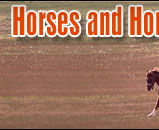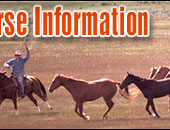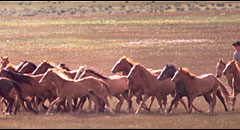 |
   |
|
|
|
You are here:
Horses
> Horse health > Care of the geriatric horse
|
Older, Elderly or Geriatric Horses Need Special Care & Nutrition as they Age
A horse is considered to reach the senior stage of life at
the age of 15 years, which implies it is estimated that one
year of a horse’s life encompasses three years of aging in
human terms. |
|
|
Fortunately for the horse aficionado, the advances in modern
technology and the innovations with respect to horse feeds
have increased the life expectancy of older horses to reach
into the thirties. Of course, on the downside of this, an
increase in aged equines within the general horse population
can also mean that less than adequate diet and proper
veterinary care will lead to a higher rate of equine
infections, parasitic infestations, dental illness, and have
other detrimental health effects. |
Horse owners have noticed that the body condition of older
horses declines rapidly at a certain point in the horse’s
advanced years. Extreme weight gain is sometimes a cause for
founder, cardiovascular illness, and arthritis. On the other
hand, sudden weight loss – which leaves the horse vulnerable
to disease – is also observed, which can usually be
explained with poor dental health, such as worn, broken or
entirely eroded teeth, which directly affects a decrease in
the ability to properly digest feed. Digestive problems
leave telltale clues in the equine's manure, and you may look
for whole grains and stalks of hay that have passed through
the horse without being properly digested. As you can see,
dental care is of the utmost importance when discussing the
health of the geriatric horse!
Of course, not all aged horses have bad teeth, yet some
still suffer from malnutrition in spite of the ability to
properly chew their feed. It is important to know that the
intestinal tract gradually decreases in its ability to draw
nutrients from the feed. To this end, the owner of the aged
horse will need to ensure that quantity is exchanged for
quality, and easily digestible feeds that are made of high
quality ingredients need to replace harder to digest feeds.
You may choose to purchase a feed specially formulated for
geriatric horses, or you may decide to put together your own
feed. If you choose the latter, keep in mind that the aging
horse is in need of larger amounts of high quality protein,
easily digestible carbohydrates that are low in starch, and
a balanced mix of vitamins and minerals.
Some horse owners have begun to use a base of broodmare feed
(you may also use growth feed) which they supplement with
complete feeds or beet pulp. Probiotics, which contain
beneficial bacteria and digestive enzymes, are added to
enhance digestive health; so are laxatives that do not upset
the water concentration in the gut and corn oil which not
only provides energy to the horse but also favorably impacts
the horse’s coat. Water in the intestines permits the feed
to move easily and prevents colic; to this end you may wish
to supplement the feed with bran mash and psyllium seeds.
Should you be unsure about the content of your feed, your
veterinarian or a feed nutritionist will be able to help you
decide if you are giving your geriatric horse the feed that
will help her or him to live healthily for years to come.

|
Read the next horse health tips article on Allergies. |
|
|
|
|
 |
|
|
|
|
|
Horse Education
|
|
|
|
|
Horse Information Topics
|
|
|
|
|
|
|
|
Horse Business Owners
|
| |
Advertise with Us
Have your horse products or services exposed to over 27,000 of our monthly visitors.
|
|
|
|
|
|